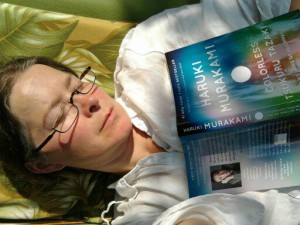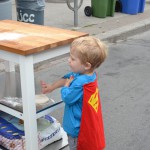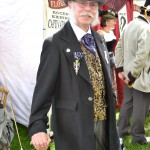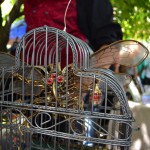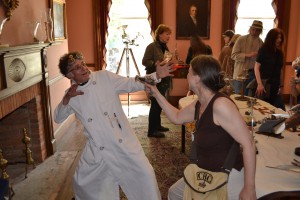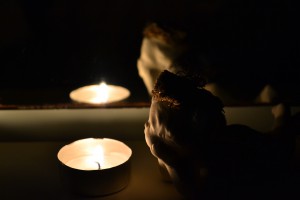In mid-August, my head cleared. One morning I woke up feeling normal again. Just like that.
In September 2012, the car I was driving was T-boned by a cabdriver on his cell phone. In seconds, I had a complicated whiplash involving my neck, shoulder and pelvis, and I had a concussion. I didn’t hit my head; I wasn’t knocked out. I had what I have come to refer to as brain slosh. My brain, one of my favourite organs, had been bruised against the inside of my skull. The injury wasn’t immediately apparent. In retrospect, I used the language people use when they have a concussion; I said I was shaken up, dazed. I was able to function, but I wasn’t fully functional.
I kept hearing that it would be a year before I fully recovered. I kept not believing that. I kept kidding myself that I was fine, although I wasn’t. Recovery from the physical injuries took some time and work, with physiotherapy, daily exercises and massage. Of course, healing takes energy, so I was chronically exhausted.
I didn’t have time to be injured, so I carried on. Of course, trying to do something challenging, like a PhD dissertation, is that much more challenging with a brain injury. I did the best I could, but every time I sat down to work on this rich and complex document I’d started, what came out was at the level of a first-grade reader; Dick and Jane visit Vesalius for a lesson in medieval anatomy. Even though I was the only one who saw that work, it was embarrassing.
And there was the terrifying thought that this was it. That I wouldn’t recover, that I’d never be able to write again, that the books planned in my head would stay trapped there, unable to get out. After a few months, I was able to write more successfully, but it was much harder work than it had ever been.
I couldn’t think clearly. It was as if there was a cloudy veil over my brain. I could detect the thought, but had to tease it out of a haze. I was working through some kind of early film dream sequence gossamer fabric special effect. The work seemed to float. It never fully clarified. Even now, when I edit sections written through that haze, I can’t quite grasp them. They’re blurry and I’m still unsure if they work.
My memory was also affected. Routine information would suddenly evaporate. I spent three days trying to remember the name of someone I work with, someone I know. Bass lines I was relearning for the band reunion would quietly dissipate, even though I’d nailed them with practice. I said things that I couldn’t recall later. Someone would kindly follow up on some concern I’d expressed, and I would have no memory of verbalizing it or even thinking it.
But forty-nine weeks after the accident, three weeks shy of a year, I awoke one morning and my head was clear. By then, I’d come to accept the murkiness of my thoughts. I’d accepted this new normal. I’d accepted that I was never going to be fully functional again, that I would never function as well as I had. To wake up suddenly feeling normal again is a wondrous thing. But I couldn’t quite trust it at first. I didn’t know if it would last. To my relief, it has.
Last fall, it was as if my brain was re-checking its circuits, or maybe rewiring some connections. I experienced intense, lucid memories. Things I hadn’t recalled in decades would suddenly spring up with great clarity, sometimes with associated sensory cues. I recalled the taste of cocoa quickies from grade school home ec. I inhaled the scent of the bath beads I used to get in my Christmas stocking. I recalled, with great longing, the red mohair sweater my Mum knitted me that I practically lived in through high school. I felt the impact of reading the two column inches on a back page of the Examiner about Jim Croce’s death. These recollections didn’t have the faintness of normal memories; it was as if I was reliving them or verifying their veracity, checking that they were still intact.
The fatigue I’d been carrying had also become my new norm. I often felt too exhausted to work, like I was dragging myself around. I managed to stay on top of things, but not get ahead, and the bare minimum seemed an inordinate effort. I often felt swamped and overwhelmed, like I was barely managing my life. Again, I’d adjusted to this new reality. I rationalized that because I was getting older, I should expect to have less energy. I’d accepted this new state, telling myself that I just had to hang on a little longer, work a little harder, to get through the PhD.
It wasn’t until the Christmas holiday that I bounced back, again having assumed that I wouldn’t. I started the New Year with a renewed energy and vigour that I hadn’t felt in about fifteen months. And that’s exciting!
People often say that they have a good feeling about a New Year, but I’ve rarely felt this ecstatic in January. Although it had some wonderful moments, I’m very happy to put 2013 behind me. It was one of the tougher years I’ve lived. I felt like I was treading water, trying not to drown, rather than making progress. Now I feel fully recovered, as if I’m back on top of things, as if I can move forward in my life. And what an exciting life it is! I’m making good progress on the dissertation and expect to finish this year. Once that’s done, I can resume revising the new novel. I’m enjoying teaching university communication. I’m back into music and knitting (more on that in a future post), I’m using my time and energy efficiently, I’m sleeping well, I’m socializing more, etc. Life is good.
© Catherine Jenkins 2014
Like this:
Like Loading...



